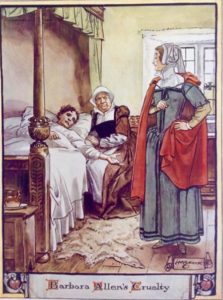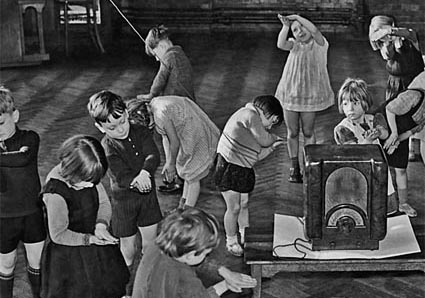My little Gnudren,
Old Gnu hopes you have had an edifying summer. Today Old Gnu offers you another Verbotene Stucke, the song, Lord, It Belongs Not to My Care [words by Richard Baxter (1615-1691)].

Gnu’s setting was written in circa 1989. The motivations for writing were manifold. But it was an attempt to get revenge on the British folk song, Barbara Allen, which he incorporated into this song. Young Gnu was made to sing this in the 1950s Schools Broadcast of Singing Together. I will presently explain why young Gnu hated this song with such vehemence.
Singing Together was, usually, a wonderful weekly radio broadcast for junior schools where we all joined in. We were taught some wonderful songs over the airwaves. Young Gnu far preferred this to its broadcast counterpart, Music and Movement, in which a lady with a 1950’s BBC voice usually instructed us to pretend we were fairies and then to dance round some imaginary mushroom. This creative dance suggestion would be concluded some two minutes later with a soupy voice saying, and now rest children, and pretend you were a hedgehog rolled up in a ball resting under the mushroom. It was enough to make a 7 year old Gnu feel dangerously nauseous. You think Gnu exaggerates and you don’t believe him? Then listen to a short snatch of this unbelievable programme – please don’t drop your balls.
The Ballad of Barbara Allen is about some dude called Sir William (or John, or James depending on your regional preference settings) who lay on his deathbed because said Barbara, who he really fancied, gave him the cold shoulder. Young Gnu thought: “For heaven’s sake, man, get a grip on yourself!” Ms Allen rightly refused this wet blanket’s advances, but was summoned to his sickbed. Having her wits about her she declared, “I see that you are dying”. But after the said Sir William (or John, or James) did in fact die, or so the story goes, she had pangs of remorse and felt responsible for the death of this manipulative mome. She ordered her mother to make her bed because she too was going to die of sorrow and regret. The implied moral of this story? Girls, never refuse a feeble man in case he dies of self-inflicted sorrow. You will be responsible for a death. Even then Gnu could see this was moral blackmail of a male dominated world. (Gnu feels much better getting this off his chest some 60 years later!)

This illustration underlines the horrid intended moral of the tale that young Gnu discerned way back in the 1950s when he wore short trousers and a school cap. The visual portrayal and posture of Barbara makes her out to be a wicked callous person. You wait till I find the illustrator. I will give him what for!
So in the late 1980s when an older Gnu was feeling nauseated by the surfeit of effeminate warship songs about how much we loved God, (some were brilliant), he took to the words of Richard Baxter. These are not about love and passion that kills, but a loose detachment to life in the service of God. Gnu used the tune of Barbara Allen to create a contrary mood to that of the original folk song. So Gnu’s arrangement has some disjointed ‘detached’ harmonies in parts to give a sense of I couldn’t care one way or the other. For good measure Gnu threw in another folksong melody about some bloke called O’ Wally-Wally; obviously a double barrelled name, probably Irish. This O’ Wally-Wally was someone who found he/she was in something deeper than water, and needed to cross it. Gnu uses this melody to express Richard Baxter’s sentiment that whatever soup you’re in, Christ has been through it before. So you see, on reflection, is it any wonder that Gnu’s fine song didn’t make it into the limelight of the 6.30pm evening service? Give it a listen, and see what you think. Gnu thinks it’s perfectly charming. It was beautifully sight-read and recorded at the rehearsal of the long suffering 6.30pm choir after only a couple of runs through. The only compensation for them was that they knew a miraculous Louise Adams tea was about to follow imminently.
Vetus Pater Gnu
Academiae Musicorum et Theologia
Turris [LA]
XIX September MMXVII
*The title of this blog refers to the original publication from which Baxter’s words are taken: “Poetical Fragments: Heart Imployment with God and Itself; The Concordant Discord of a Broken-healed Heart”, Printed by T. Snowdon for B. Simmons, at the Three Golden Cocks at the Westend of St. Pauls (1681)

